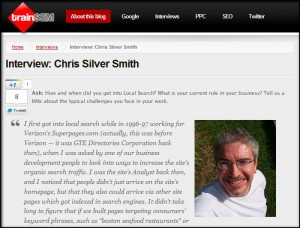Google Maps has introduced “bubble ads” which feature an advertiser in the info bubble/tooltip that appears above pinpointed locations in the map interface. Mike Blumenthal points these out with a “rogue’s gallery” of inappropriate ad placements. I believe these must be the “big changes” alluded-to in Google insider rumors I reported upon a few weeks ago.
It’s not hard to find instances of ads which arguably should not be allowed to be displayed smack along with a business’s listings. Here’s one I just grabbed showing an ad below a local doctor’s listing — the ad urges consumers and potential patients to “Check for disciplinary action”, and has parsed the doctor’s name into the ad itself — casting an implicit aspersion upon the doctor, and potentially damaging the doctor’s conversion rate if the advertiser’s site has some sort of negative information about the doctor:

As Mike points out in his post, there are many cases of inappropriate ads showing up with these — and, it’s hard for me to find a whole lot of cases where an ad might be considered “appropriate” from the perspective of businesses “graced” with oddball ads. I can see where such ads would make sense for some landmarks and other non-business places, but for business listings themselves, such ads are at best distracting and at worst they are actually damaging to businesses’ referral rates.
From the perspective of small businesses, the new ads are far worse than having nearby competitors appearing on their profile Place Pages — these ads are visible at a higher level in the consumer research cycle, and interfere with the potential for users to move any deeper in clicking through to read more details about the business’s information. The related listings showing and ads which have been displayed on Place Pages are shown lower on the page and are not as prominent in the cycle as consumers seek provider information.
One has to wonder how Google can keep a straight face in claiming that the advertising side of the house is separated by a “firewall” from the search engineering side at this point!
One also wonders how Google intends to spin this to local businesses — it feels very extortionary — “you’d better advertise on your own listing, or we’ll let someone else take it hostage!”
This appears to be yet another of many instances where Google does a poor job in designing the online user-experience due to an obstinate refusal to do any sort of user experience testing or focus group testing for local business owners — which are one of the major constituent audiences which makes use of Google Maps. Not only does this new ad presentation *not* improve or avoid detracting from the user experience, it damages how Google is perceived in the eyes of millions of small businesses.
How is it helpful to Google Places to make local businesses feel downright hostile to your company?






Argent Media
February 14th, 2012 by Chris Silver SmithI have just launched my own agency, Argent Media, a search marketing firm focused on SEO, Local SEO, Online Reputation Management, and Social Media.
It’s just me for now, although I have friends and contractors I’ve partnered with to collaborate on some projects.
Read the formal press release announcement at: Local SEO Industry Expert Founds Argent Media Search Marketing Agency in Dallas.
Tags: announcements, Argent Media, chris silver smith, SEO agency
Posted in General Commentary, Search Engine Optimization (SEO), Startups | 1 Comment »